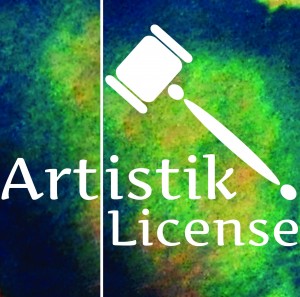Working hard at protecting the rights of artists and creative entrepreneurs in India, is a dedicated venture called ‘Artistik License’. Artistik License is an interesting new start up that seeks to go to what is really the heart of the IP-incentive system – helping artists and creators. They describe themselves as a legal education and services platform dedicated to addressing the needs and queries of artists and creative entrepreneurs in India. With a strong emphasis on making legal know-how accessible, Artistik License maintains an Information Resource, provides basic legal services and works towards empowering the artist and entrepreneurial community through awareness raising workshops and discussions. SpicyIP is happy to bring to its readers an interview with Manojna Yeluri, founder of Artistik License. [Though we’ve had a couple of SpicyIP Interviews in the past (see e.g., our interviews with Kritikal Solutions, Intellectual Ventures and IP Checkups), we’re hoping to start conducting them on a more regular basis from now. If you have any feedback or comments for us on this renewed column, please do write in.]
SIP: What prompted you to start Artistik License?
MY: While there are a lot of great resources on legal regulation and IP law, I felt that there was something missing when it came to helping connect artistic content creators and creative entrepreneurs with legal know-how. Artistik License was really my way of bridging that gap between both sides and providing artists with a platform where they could learn more about how the law can actually help them, rather than avoid it as something that was too complicated or convoluted.
SIP: What sets Artistik License apart from the services offered by entertainment law firms?
MY: At the moment, I think what sets Artistik License apart are two basic things – (1) the understanding that the artist and/or entrepreneur is important in the conversation and that unless there is a clear appreciation and understanding of what they do, any legal advice given is just useless jargon. The creative community often feels misunderstood by the business and legal communities, and I think Artistik License really works on eliminating that communication gap by respecting the artist for what they do, and advice them as content creators instead of providing them with a template of solutions. At Artistik License, there are no templates – everything is discussed and executed on the basis of the client’s needs and interests. (2) Artistik License really is about empowering the artistic and entrepreneurial community. I always like to say prevention is better than litigation and I honestly believe that a little legal know-how can go a long way in tipping the bargaining power scales in the artist or entrepreneur’s favour. This is why Artistik License focusses on awareness and empowerment through its blog or info resource, workshops and discussions.
SIP: Can you share with us the details of any interesting case that Artistik License handled?
MY: Some of the more interesting cases I’ve dealt with have to do with publishing agreements and music management agreements where signing away the rights over content is always something that needs to be re-negotiated. I think though, the most interesting cases really come from the visual arts and hand-made artistic works sector. When I first started working with artists and sculptors who are primarily engaged in the production of handmade, bespoke articles I don’t think I ever expected the degree of concern over IP that I witnessed. Goes to show you that we don’t always know what’s going on. There is a thriving industry of freelance artists and producers of handmade jewellery, accessories and household décor that is really affected by copyright infringement. In more than one case, I’ve had to negotiate between clients in the handmade jewellery/accessories business and other competing manufacturers as well as online retailers. These negotiations are almost always a little aggressive owing to the fact that companies, retailers and manufacturers are constantly trying to exploit independent artists. This is really the reason why there’s need to be more awareness on artist rights.
SIP: How important is it for an artist to invest in safeguarding his rights?
MY: I think that it’s absolutely important and necessary for artists to learn about how to protect their interests and safeguard their rights. We live in a wonderful time where there are so many independent content creators in India just churning out amazing original musical, dramatic, literary and artistic content for all the world to see. The amount of love, hard work and resources they invest in the creation of their work – it almost seems criminal why they would avoid taking it one more step, and learning about how to protect it from unauthorized copying or distortion.
SIP: When you started out with Artistik License, what were your biggest challenges? How receptive were people to the concept?

MY: In India, the entertainment scene, particularly the independent scene is in the middle of a big transformation. There’s never really been a great deal of emphasis on professionalizing the scene, but all that’s changing now. There are a lot of really great independent labels, publishing and media houses that are part of the scene and changing things. I’m happy that Artistik License is in the midst of all this sea-change, but I think it’s had to face its fair share of challenges. On one side, I had to convince artists that my work with Artistik License was honest, and meant to help them make the most out of the existing legal framework. A lot of artists and entrepreneurs are so wrapped up in their creative projects that its hard for them to look at the legal stuff, and honestly there is some hesitation when it comes to taking legal advice, but I like to think that Artistik License is changing that by replacing that fear with precise and accessible legal inputs. On the other side, I found myself with Artistik License on the sidelines of the legal industry – neither fully a firm, nor a research organization, I think it was a bit difficult to place what Artistik License is getting at. But things are only getting better, so I’m optimistic about Artistik License finding it’s own niche between both artistic and legal communities.
SIP: In your opinion, how informed are artists about their rights today? Is there a general apathy when it comes to being aware of their legal rights? How is the scenario different in other countries?
MY: There are a lot more artists who are curious about how to protect their original work. Honestly, authorship concerns are really something that creators of original content are most concerned with and I am happy to say that there is an increasing amount of interest in figuring out how best to protect and monetize one’s content within the legal framework. We have a long way to go though – my time during my LLM at UCLA showed me how even the most amateur of artists there understood and were aware of copyright and royalties – something we need to work on big time here in India. I think the most surprising thing of all is that there are still a lot of advertising and creative agencies in India that are strangely apathetic towards artist rights – now this is something that needs to change in their own interest, as well as for the benefit of the entertainment industry.
SIP: Has the popularity of Creative Commons licenses caught on in India?
MY: I’m not so sure yet, but there’s a lot of scope for growth. One of the most important discoveries I’ve made for myself relates to how many artists create projects that they necessarily want to leave open and un-restricted. So there are a lot, and I mean A LOT of questions clients and artist- friends have about how to use CC licensing – I think there’s already a lot of original musical content that’s being shared in India under CC licensing.
SIP: Do you see the copyright regime in India as enabling or stifling creativity- Is it unfairly titled in favour of the artist or are there too many restrictions on those who want free access to creative work?
MY: I’m not sure if I can give a very unbiased answer to this question since a lot of the work I do influences my thinking in favour of artists and entrepreneurs. I think that this question on copyright law really has to be asked from a larger perspective – does copyright work in incentivising creative behaviour? To be fair, I think the answer is a soft no. There are many who benefit from automatic registration and other benefits that the copyright regime offers but at the same time, experimental visual artists and artists creating art installations as well as electronic music will tell you that there’s nothing worse than the copyright regime. I think these questions get even more complicated when you throw cultural heritage, folk art, dance and music into the mix, with so much ambiguity on who could be the rightful author and whether ownership is even a legitimate claim to make.
SIP: How has the journey been so far?
MY: Grueling but awesome. I love doing what I do because it really brings together the things and people I appreciate the most, but it’s hard work building something from the ground up. Having said that, I’ve met some wonderfully inspiring people from the artistic, entrepreneurial and legal communities and that’s something I might’ve missed without Artistik License. I am really looking forward to more collaborations and projects this year, and at some point soon I really want Artistik License to also morph into a space where young lawyers and law students can learn more about creative processes, thereby making better informed connections with IP law they study. Lots of plans, and I’m excited for the future and really enjoying the present.
SIP: Is there anything else that you would like to add?
MY: I really believe in the power of community, so I’m always up for a discussion or conversation about artist rights. You can always get in touch via social media – Artistik License is on Facebook and Twitter, and I like to encourage a lot of honest interaction via that. I also want to say a big thank you to Spicy IP for hearing me out. I think it’s great to have platforms like this which encourage honest scholarship and discussion on IP.
[Manojna graduated from NALSAR University of Law in 2010 and went on to pursue her Masters at UCLA, where she specialized in entertainment, media and IP Law. After a brief stint at a corporate law firm and a digital legal publishing/education platform, she independently founded Artistik License. SpicyIP wishes Manojna Yeluri and Artistik License all the best for the future!]

